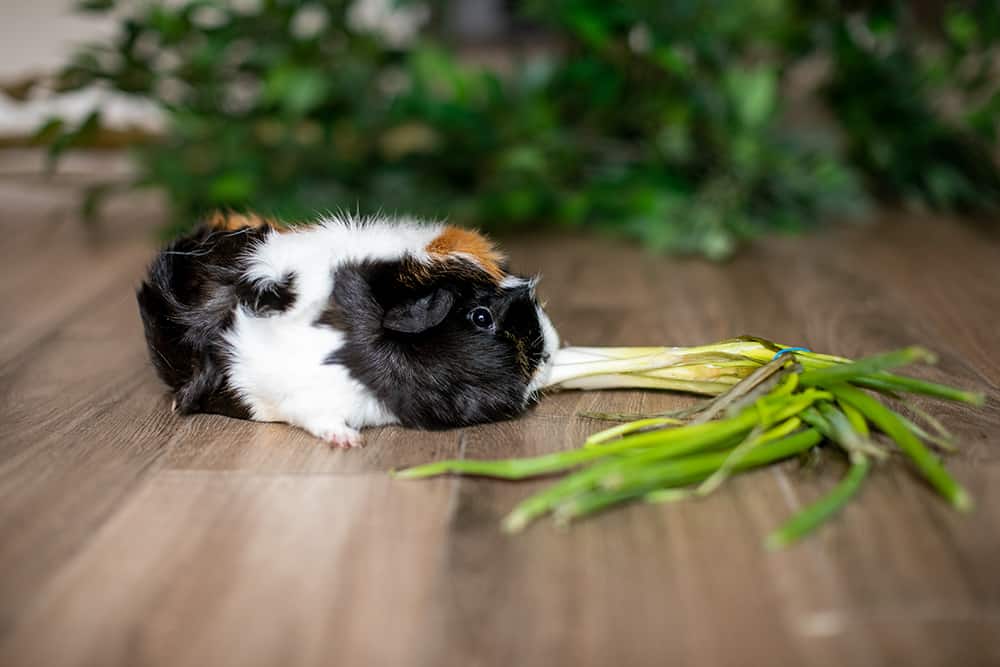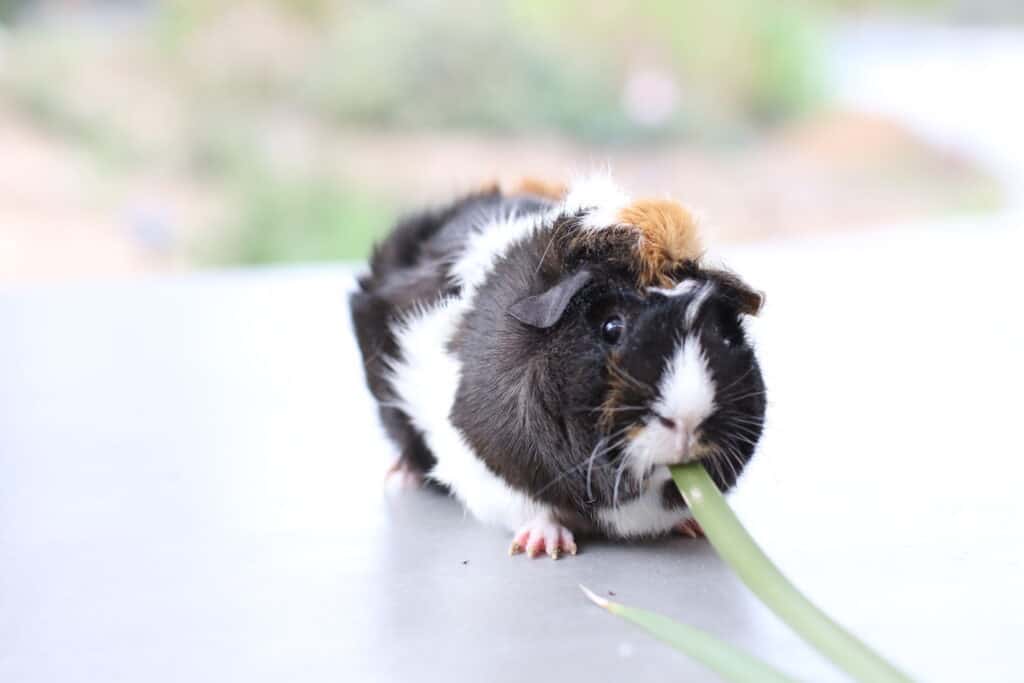As an Amazon Associate we earn from qualifying purchases.
Can Guinea Pigs Eat Chives?
This blog post will answer that question and provide additional information about chives and their nutritional value. We will also discuss the risks associated with feeding chives to your guinea pig.
Chives
Chives are a type of onion that belongs to the Allium genus. This genus also includes garlic, leeks, and shallots. Chives are native to Asia and Europe but are now grown in many parts.
Chives have a long history of being used as a culinary herb. They have a milder flavor than other onions and garnish soups, salads, and other dishes. Chives are also a popular ingredient in many dips and sauces.

Nutritional Content Of Chives
Chives are a good source of:
- Vitamin A is important for vision, the immune system, and cell growth.
- Vitamin C: This is important for the immune system and skin health.
- Folic Acid: This is important for pregnant women to prevent congenital disabilities.
- Chives also contain small amounts of calcium, iron, and magnesium.
Guinea Pigs
Guinea pigs are small mammals that belong to the family Caviidae. They are native to South America and were first domesticated by the Incas. Guinea pigs are popular pets due to their docile nature and adorable appearance.
Guinea pigs are herbivores, and their diet should consist mostly of hay, fresh vegetables, and a small number of pellets.
Can Guinea Pigs Eat Chives?
No, chives are not safe for guinea pigs. Guinea pigs cannot tolerate onion or garlic, including chives. These plants contain compounds that can cause anemia in guinea pigs.
Feeding your pet guinea pig chives can also lead to gastrointestinal upset and diarrhea. If you suspect your guinea pig has eaten something, it shouldn’t have, contact your veterinarian immediately.
Health Risks Associated With Chives
The major health risks include:
Anemia
Chives can cause anemia, a condition in which there are not enough healthy red blood cells to carry oxygen to the body’s tissues. Anemia can result in fatigue, weakness, and shortness of breath.
Internal Bleeding
Chives can also cause internal bleeding. This is because they can damage the lining of your guinea pig’s blood vessels. This can lead to serious health problems such as organ damage or death.
Urinary Damage
Chives can also damage your guinea pig’s urinary tract. This is because they can irritate the lining of the bladder and urethra. This can lead to inflammation and infection.
Weakness
Chives can also cause weakness. This is because they can interfere with the absorption of iron. Iron is an important mineral that helps your guinea pig’s body create new red blood cells.
Indigestion
Chives can also cause indigestion. This is because they can irritate the lining of the stomach and intestines. Indigestion can lead to diarrhea, vomiting, and weight loss.
As you can see, there are many risks associated with feeding chives to your guinea pig. If you suspect that your pet has eaten chives, it is important to seek veterinary care immediately.
What To Do If Guinea Pig Ate Chives?
If your guinea pig has eaten chives, the first thing you should do is call your veterinarian. Chives can be dangerous to your pet, and it is important to get them treated as soon as possible.
Your veterinarian will likely want to do a physical examination and may recommend some blood tests. These tests will help them determine if your pet is anemic or has other health problems.
Your veterinarian will also likely want to give your pet some supportive care. This may include giving them fluids to prevent dehydration and medication from helping with the pain.

Healthy Alternatives To Chives
There are many healthy alternatives to chives that you can feed most guinea pigs. Some of these include:
Kale
Kale is a nutritious leafy green high in vitamin C and calcium. It is also a good source of fiber. Kale belongs to the Brassica family, which also includes cabbage and broccoli. Kale can help boost your guinea pig’s immune system and keep their bones healthy. Guinea pigs eat oregano as well.
Carrots
Carrots are a good source of vitamin A, fiber, and potassium. They can also help keep your guinea pig’s teeth healthy. Carrots are a safe and healthy treat for your pet. Carrots belong to the umbelliferous family, which also includes parsley and celery. Guinea pigs eat fennel as well.
Lavender
Lavender is a good source of vitamin C, fiber, and folic acid. It can also help keep your guinea pig’s urinary tract healthy. Guinea pigs eat lavender and it is safe for them as well.
Hay
Hay is an important part of a guinea pig’s diet. It is a good source of fiber and helps keep their digestive system healthy. Hay also provides essential nutrients that your guinea pig needs to stay healthy. Hay belongs to the grass family and is a safe and healthy treat for your pet.
Parsley
Parsley is a good source of vitamin C, calcium, and iron. It can also help keep your guinea pig’s urinary tract healthy. Guinea pigs eat parsley and it is a safe and healthy treat for your pet. Parsley belongs to the umbelliferous family, which also includes carrots and celery. Guinea pigs eat herbs as well.
Red Cabbage
Red cabbage is a good source of vitamin C and fiber. It can also help keep your guinea pig’s immune system healthy. Red cabbage belongs to the Brassica family, including kale and broccoli. Red cabbage is a safe and healthy treat for your pet.
Apple
Apples are a good source of vitamin C, fiber, and antioxidants. They can also help keep your guinea pig’s teeth and gums healthy. Apples are a safe and healthy treat for your pet. Apples belong to the rose family, which also includes pears and plums.
Peach
Peaches are a good source of vitamin A, fiber, and potassium. They can also help keep your guinea pig’s skin healthy. Peaches are a safe and healthy treat for your pet. Peaches belong to the rose family, which also includes apples and plums.
Spinach
Spinach is a good source of vitamin A, iron, and calcium. It can also help keep your guinea pig’s bones healthy. Spinach belongs to the goosefoot family, including beets and Swiss chard. Spinach is a safe and healthy treat for your pet.
As you can see, there are many healthy alternatives to chives that you can feed your guinea pig. If you are ever unsure about what to feed your pet, always consult with your veterinarian. They will be able to give you the best advice for your pet’s individual needs.
Conclusion
In conclusion, guinea pigs can eat chives. However, it is important to consult with your veterinarian before feeding your pet any new food. There are many healthy alternatives to chives that you can feed your guinea pig.
If you are ever unsure about what to feed your pet, always consult with your veterinarian. They will be able to give you the best advice for your pet’s individual needs. Thanks for reading!